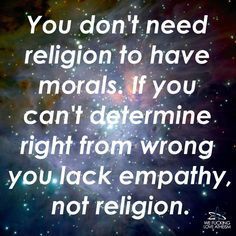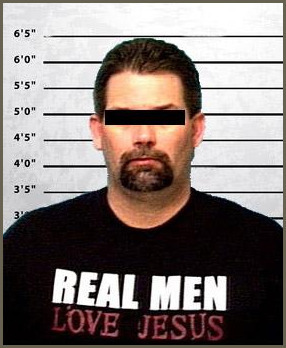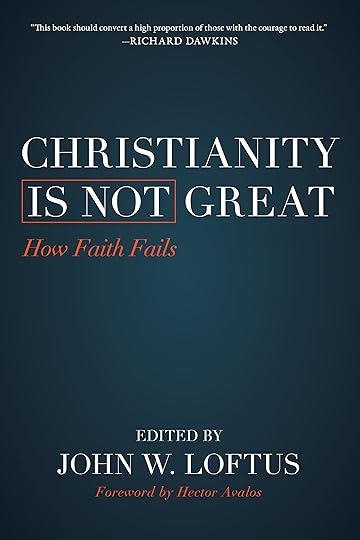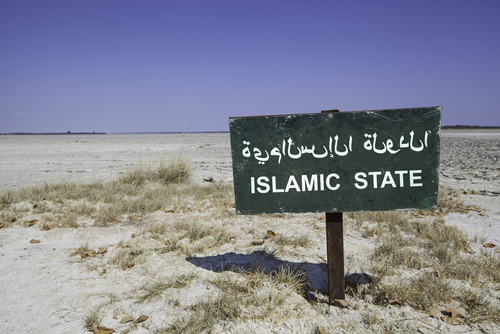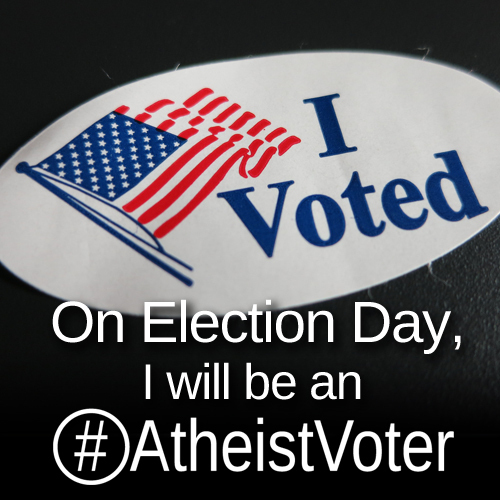Hemant Mehta's Blog, page 1896
October 21, 2014
There Are Still Christian Schools with This Awful Fire Safety Policy
Last year, I posted about the awful fire safety policy at one fundamentalist Christian college. If a fire alarm rang, even in the middle of the night, women were required to change into a skirt before they went outside. Not having the ability to just run out in pajamas could, of course, cost them valuable seconds in the case of an emergency.
I hear those policies have since changed at places like Pensacola Christian College and Bob Jones University, but Darrell at Stuff Fundies Like just posted a screenshot from Instagram of two young ladies at a similar school where a similar policy is still in place:
I can’t believe any school would still stand firm on that unnecessarily, ridiculous policy. And the only change I suspect they’ll make is to ban selfies by the end of the day…
Where Does One Even Begin Countering This Insane View of “Evil” Atheists?
Jeff Porter, who writes under the pen name UGAFender, is
A Georgia boy, born a raised. I’ve traveled to 3 of the 4 corners of our country and to several spots off the reservation… I have interests that range the gamut, so there’s no telling what category I will cover.
Feel free to insert sics where you feel they belong.
With his intellectual pursuits “ranging the gamut,” Porter focused his powers of observation and logic on atheism the other day.
Atheism is such an empty vessel; a bleak and vacant belief in a brief and futile and purposeless existence.
A belief that we came from nowhere and we are headed for nothing must sustain a vacuum where one’s soul should otherwise be abounding with hope and joy and comfort in the knowledge of the truth that we are eternal and ever lasting beings, created for a purpose and with a destiny.
Honestly, how cold and desolate is a belief that there’s no purpose to all this; that this is all nothing more than a cosomologic accident?
If that were truly the case, then on what grounds do morals exist? If we are all merely random accidents, then why would anything we do really matter?
In truth, we are not mere accidental and random chance. We were planned and created; and loved by that Creator.
The opposing view of that is evil.
On what grounds do morals exist? It’s 2014 and we still have to go over that? Again and again?
At what point do we just give up and let people like Porter stew in their swamp of ill-considered, narrow-minded guff?
Quebec Driver Acting “In the Name of Allah” Mows Down Two Canadian Soldiers
A Quebecer shot dead by police after running down two Canadian soldiers told a 911 operator he was acting in the name of Allah…
The Prime Minister’s Office says the dead suspect, identified as Martin Couture-Rouleau, had become “radicalized.”
Two police sources [said] that the incident just after 11:30 a.m. was a possible terrorist attack against the unidentified soldiers, one of whom was in critical condition. Police gunned down Couture-Rouleau, 25, in his hometown of Saint-Jean-sur-Richelieu, 30 minutes south of Montreal on Monday morning.
He charged at the officers wielding a big knife with a curved handle, witnesses claim. Police fired seven bullets to stop him.
Canadian jihadist Martin Couture-Rouleau
Authorities had had their eye on the man since last year, they say.
Couture-Rouleau became known to the RCMP after a relative alerted police to the man’s terrorist leanings… Couture-Rouleau had grown out his beard and started wearing a turban after converting to Islam a year ago. It appears that the suspect posted jihadist propaganda to the Internet under the name Ahmad Rouleau.
The Montreal Gazette reports that
On Couture-Rouleau’s Facebook page, where he identified himself as Ahmad Rouleau, the man had posted dozens of images and comments in English and French about hell and betrayal since creating the account in May 2013. His comments included: “Let not believers take disbelievers as allies rather than believers. And whoever does that has nothing with Allah.”
Another post, dated April 14 of this year, began: “Allah has promised the hypocrite men and hypocrite women and the disbelievers the fire of Hell, wherein they will abide eternally.”
Canada recently agreed to send six fighter jets to take part in the West’s military campaign against ISIS terrorists in Iraq, but it isn’t yet known if that was the motive for Couture-Rouleau’s attack.
Guess What You Find When You Search For “Youth Pastor” in Google Images?
A sea of sexual-offender mug shots, is what.
Surprised?
Youth pastors diddling their young charges represent
… a time-honored evangelical tradition which Christian culture is loath to speak of, yet everyone who grew up in Christian culture knows youth pastors (plural) who were deposed due to the dubiously defined Moral Failure. And those are just the ones who were caught.
Here’s the latest creep who got caught.
The youth pastor’s fall from grace is never less than gory. Once found out he will either make a tearful public confession, feebly defend his shredded reputation, or both. He is then ceremoniously fired and flees town under a spectacular shower of emotional fallout while the abandoned youth group reels from this strange new trauma which Christian culture has no idea how to handle. In their heads they replay the years of Purity Talks he gave whilst conducting clandestine activities on the side.
Sounds about right. Be sure to read the comments on that article.
Of course, there are cool youth pastors too. Like Ignatius, who has an expensive haircut, a hot wife, and who wants everyone in his young audience to “bow their eyes and close their heads.” Ignatius rawks, and he knows it.
(Thanks to Dan Mentos for the tip)
Is Christianity Beneficial or Harmful to Society?
Christopher Hitchens memorably wrote about why God Is Not Great. Now, John W. Loftus has compiled a new anthology building off of that premise and showing us why faith is far from a virtue.
In his book, Christianity Is Not Great: How Faith Fails, Loftus and a panel of experts (including Peter Boghossian, Victor J. Stenger, and Annie Laurie Gaylor) write about why the problem with religion isn’t just a fringe group of believers, but faith itself.
In the excerpt below, Loftus answers the question: “Is Christianity beneficial or harmful to society?” (I have excluded footnotes)
To answer this question I’ll deal first with the supposed societal benefits of the Christian faith and later to its societal harms. Whatever benefits we think the Christian faith has depends at least in part, on which society we’re talking about. When it comes to non-Christian societies, or cultures, Christianity has proven itself extremely harmful to them, as several chapters in this book show. That should be the end of the story.
Nonetheless, in Dinesh D’Souza’s book, What’s So Great About Christianity, the author argues Christianity is great because most people in western culture are Christians, that Christianity is growing in the world, and that Christianity is unique. Of course, these claims are all true. Tell us something we don’t know next time. That doesn’t make Christianity great. It only shows more people in the western world are Christians, that Christianity is growing and that it’s unique. By the same standards Islam meets two of these criteria, making it great too. And there is nothing about a majority that proves Christianity is true, especially since there is no such thing as Christianity, only Christianities, as David Eller has argued, which are reflected in the polls. D’Souza also claims Christianity is beneficial, although in the process he paints an unbalanced and sometimes ignorantly rosy picture of it, especially when it comes to the basis for morality, the origins of democracy and of science. It is not true Christianity can take credit for all that’s good in our society. And it is not true that Christianity causes no serious harms within it either. Chapters in this anthology argue otherwise.
Human morality and politics are human inventions which have evolved over time. Religions are human inventions too. And they too evolve. They are inextricably linked with their given cultures. So it stands to reason that any given religion is at least somewhat beneficial to its particular culture because, as a human invention, it helped to make that culture in the first place. All religions must therefore be beneficial to its given culture to some degree, otherwise no one would ever embrace them. We would expect this. Just ask Amish people if their religion has social benefits, or Buddhists in Thailand, or Shintoists in Japan, or Muslims in their cultures, and they will all say they do, and that their cultures are better than ours, and that this shows their religions are true too. Furthermore, as a given culture evolves so also does its religion, such that the religion of yesterday was beneficial to the culture of yesterday, just as the religion of tomorrow will be beneficial to the culture of tomorrow. So even if many of D’Souza’s beneficial arguments are valid ones they prove nothing more than that a Christian religious culture is beneficial to a Christian religious culture, which is a tautology and therefore trivially true. What we wouldn’t expect is for a religion to cause as much harm as Christianity does, which is the major point of this book.
The fact is that several non-Christian cultures were great by the standards of their day, and even ours to some degree, most notably ancient Greece during the golden ages, the Roman Empire in its early stages, several of the dynasties in ancient China, the Islamic Empire for Muslims under Muhammad, or the historic Japanese culture — none of which were Christian ones. So there is no evidence we even need Christianity to have a good society. Even largely atheist societies have been shown to be good ones by Phil Zuckerman. Therefore, if having a good society proves the dominant religious or non-religious viewpoint is true, then atheism is true by that same standard.
D’Souza and others will go on to tell us Christianity is great because it was the main motivator in starting most early American universities, most of our hospitals and most food kitchens. But these things would have been started anyway, if for no reason other than necessity. Other non-Christian cultures have them. It just happened that Christianity has been the dominant religion in America for a couple of centuries, that’s all. Besides, these things were probably not started by Christians out of altruism, or any desire for a better society, but as a way to convert people. After all, who are most vulnerable to the Christian message? They are the sick (hospitals), the poor (food kitchens) and young people leaving home for the first time to enter universities, which were mostly started to train preachers.
Turning next to the societal harms of Christian faith, it depends this time on which type of Christianity we’re talking about. The more that Christians embrace reason and science the less they cause harm. The less that Christians embrace reason and science the more they cause harm. I very much doubt, for instance, that the Christianity embraced by John Shelby Spong would cause much harm. He has argued in a number of books against conservative evangelicalism. In his book, The Sins of Scripture, he agrees with many of the issues we write about in this present anthology. In it he embraces environmental concerns and homosexuality while condemning both sexism and anti-Semitism. However, when it comes to the fundamentalist, conservative, or evangelical wing of Christianity, one anonymous person said it this way:
Not only is fundamentalist Christianity the greatest threat in the United States to science, tolerance, and social progress, but it is also the most prevalent form of Protestant Christianity to be found in our nation, whether you like it or not. It is the fundamentalist religious right that holds the reigns of the Republican party (which currently controls the nation, in case you didn’t realize), and it is this same fundamentalist religious right that lobbies for the teaching of lies in public school and fights against funding for embryonic research that could potentially save the lives of millions. Whether you like it or not, it is this flavor of Christianity that makes the loudest, most obnoxious, most dangerous impact on the world today, giving us plenty of good reason to direct the brunt of our attacks in its vicinity.
When it comes to the political, scientific, social, and moral spheres, the ones we focus on in this book, Christianity — especially the conservative or evangelical type — has caused and still causes a great deal of harm. To the degree the various kinds of Christianities have done good in the political, scientific, social, and moral spheres, it is not because of believers’ faith. Instead the good done has followed from reasoning about how to solve real human needs. And while their faith might have motivated them to do good in these spheres, good intentions of Christians are simply not enough, as the chapters in this anthology show. Even with the best of intentions there are always some bad unintended consequences that result when starting with harmful beliefs and attitudes.
Christianity Is Not Great: How Faith Fails is available online and in bookstores starting today.
(Excerpt reprinted with permission of Prometheus Books)
Islamist Morals: ISIS Brutally Murdered 700 People… After a Man Was Caught Smoking a Cigarette
Three months ago, fighters of the Shaitat tribe in Syria had to throw in the towel when it became clear that their ISIS foes had superior firepower. The Washington Post reports what happened next:
We wanted to save our people,” said Abu Abdullah … describing how they agreed to a truce with the militants in mid-July. The Islamic State was permitted to enter the town and establish a garrison, but local leaders were left in charge, he said.
Relations quickly frayed. The crunch came, the tribesmen in Reyhanli said, when Islamic State fighters whipped a local man who was caught smoking a cigarette in the street, a crime under the Islamic State’s harsh interpretation of Islam. The man’s brother, incensed, shot at a passing Islamic State patrol, killing one of its fighters.
The brother was arrested and publicly beheaded, triggering an outpouring of rage. Residents marched on the Islamic State’s headquarters, forcing its fighters to flee.
But the relief from the Islamist fundies was only temporary.
The militants then brought in reinforcements and began shelling the town, using artillery they had captured the previous month in Iraq. After a three-day barrage, the Islamic State militants moved in. They rounded up all the surviving men and boys older than 15 they could find and set about systematically killing them.
Over, in the end, a cigarette.
A photo essay on an Islamic State blog boasted of the different ways tribesmen were killed, including beheadings, mass shootings and a crucifixion. A video shows how the militants lined up scores of captives on a road, their hands bound, then set about clumsily decapitating them, one by one. The executioners, speaking in Tunisian, Egyptian and Saudi accents, taunted those not yet dead by swinging severed heads in front of their faces and telling them, “It’s your turn next.”
And then they’d make good on that promise. About 700 people were killed, the greatest known single atrocity since ISIS’ campaign for the Caliphate began, 18 months ago.
Said one of the survivors:
“Now we hate everyone who prays. Now we hate even beards.”
(Image via Shutterstock)
Doctors (Without Borders) Keep Battling Ebola Despite Fear and Devastation, Knowing They May Never Come Home
I’m proud to keep donating to Doctors Without Borders/Médecins Sans Frontières (MSF). This account by medical worker Natasha Lewer is one reason why:
I’ve volunteered to go to west Africa because I heard that Médecins Sans Frontières (MSF) was getting desperate for people. When I tell Mary in HR, she says she has three questions: “1) Do you know that you don’t have to go? 2) Do you know that if you get sick, we won’t bring you home? 3) Do you know that if you die, we won’t bring your body back and you’ll be buried there?” I know MSF is famous for being straight-talking, but I’m still a bit taken aback. I answer yes to all three and go home to look for my passport.
The bravery and self-sacrifice of these men and women, and the value of their work, are worth a thousand times whatever we can give them. If you have the means, step up.
By the way, atheists have an amazing, record-setting track record supporting Doctors Without Borders (funny how you never see Joe Klein mentioning a word of that). Reddit Atheism has been fundraising for the organization for years.
Whatever your god-belief or absence thereof, at this stage of the expanding Ebola crisis, your willingness to support Doctors Without Borders means more than ever.
Oh, and if you’re not in a position to give the organization a leg up financially, offering moral support and good wishes won’t cost you a penny (nor will tweeting or Facebooking this):
Doctors Without Borders is asking our supporters to leave messages of encouragement for our staff working in Ebola projects in West Africa. Most are national staff who come from the countries and communities where the disease is taking an enormous toll, and they are experiencing the devastating effects of Ebola at home, as well as at work. Let them and all of our staff know you support their efforts.
Thanks for helping!
I Saw Left Behind So You Don’t Have To
Over the weekend, I went to go see Left Behind. That’s right, I paid for a goddamn ticket to see Left Behind. (The things I do for you people…)
We’ll be discussing the movie on the podcast soon, but I wanted to get a few thoughts out while it’s all fresh in my mind.
And if you’re unfamiliar with the story — lucky you — here it is in a nutshell: The Rapture occurs and the True Believers, sans clothes, are suddenly taken up to Heaven while all hell breaks loose on Earth. Those “Left Behind” are left to figure out what happened.
So was the film as bad as the critics says? Of course it was. That was never in doubt.
But what was questionable was whether or not this really qualifies as a Christian film. There was some heavy-handed Bible-thumping in the first few minutes, but Christianity (and the Rapture) were really just plot points around which to build the film. The story is really about a pilot dad (Cage) who has upset his family for a variety of reasons and wants to make things right… but after the Rapture, he really just needs to land his plane safely. (Apparently, thanks to Christian logic, not only do all babies get raptured, but so do all satellites and air traffic controllers.)
The bulk of the movie is about whether or not Cage can land the plane. The rest of it is about people trying to figure out where the hell their loved ones went. (It’s like that movie Identity, where the main characters are all trying to figure out what they have in common.)
God is nothing but an extra in the film. Right before the closing credits rolled, a Bible verse appeared on the screen, as if to remind us this was supposed to be about religion (since we all forgot).
Other hints that this was supposed to be a faith-based film were very subtle. There was no swearing (which would be odd in a world where people suddenly vanished…) and the Christian characters were portrayed as crazy. The only real giveaways were the trailer for an upcoming Kirk Cameron movie and the stereotypes we’ve come to expect from Christian movies. Those left behind included a gambler, an adulterer, a drug user, a Jew, a Muslim, and a whole bunch of looters. The only compelling character was a pastor who didn’t get raptured — and he was only in one scene.
The movie had almost nothing to do with the popular book series, which focuses on what happens post-Rapture. Maybe that’s for the best, but I have to wonder: If producers weren’t catering to Christians, then who was this movie for?
It sure as hell wasn’t for me.
I think my wife enjoyed it, though. She muttered something about “divorce papers” as we were leaving the theater, but I assume that was just in reference to Cage’s broken marriage in the film.
American Atheists Launches #AtheistVoter Campaign, but Will It Be Effective?
American Atheists just launched a new campaign urging atheists to get active and go vote.
The purpose of #AtheistVoter is simple: ensure that elected officials know that atheists, agnostics, and other nonreligious constituents vote — and vote in huge numbers — so they can no longer simply ignore us or take our votes for granted.
The effects of religion in public policy issues can be seen in every level of government: from anti-LGBT discrimination to restricting the healthcare choices of women, from preferential treatment for religious group in the tax code to the excuse of “it’s tradition” for allowing Christian ideology to remain part of everyday government practices.
Policies rooted in religious bigotry and theology attack the fundamental rights of the nonreligious and our fellow citizens. History has shown us the only way to change the political dialogue is to show elected officials the value of our votes. #AtheistVoter is here to provide you with quick and easy access to information about your governor and the elected officials in your state that represent you in Congress.
The website features links for voter registration, voter guides, and a list of positions that generalize atheist tendencies (we tend to support reproductive rights, LGBT rights, freedom of and from religion, etc).
Because AA is a non-profit, the site doesn’t endorse specific candidates.
While I appreciate the sentiment — and plan to vote — there’s one argument that’s ignored on the site: What happens when all the candidates you have to choose from seem beholden to religious voters? Why give them the gift of a vote when they have no desire to stand up for church/state separation?
In 2008, then-AA President Ellen Johnson encouraged atheists to stay home on Election Day because “All of the candidates court the religious voters and ignore me.” She had a point.
The question is: What’s more effective? Making it known that you vote based on your Humanist values, even if it means supporting the lesser of two evils, hoping that leads to change in the future… or staying at home because there are no good candidates?
I lean toward the former. It’s rare that any election has a candidate I fully support, but if I can nudge the government a little more in my preferred direction, I think that’s the best we can hope for. If you’re staying at home, candidates will never cater to you, and it’s just unrealistic to convince enough people in your camp not to vote to make that persuasive. Politicians pay attention to polls and how people vote, not why they decided to treat Election Day like any other Tuesday.
The Religious Right would never do something as stupid as telling everyone to sit out on Election Day. They might threaten it, but they’ve had too much success electing candidates who kowtow to their positions to make “not voting” a strategy.
What atheists need is influence. The way we get that is to make it clear that certain issues matter to us and we’ll support candidates who take a position that aligns with ours. The more of us who make that clear, the better off we all are in the long run. Even if we’re not a monolith like the Christian Right.
And if you really want to protest the lack of good choices, vote for a third party candidate. Vote for someone who has no chance of winning. But vote.
These politicians have to pay attention eventually, right?
Once Again, An Atheist Evangelizes Reason from the Sidewalk and Then Analyzes His Conversation with a Stranger
Once again, Anthony Magnabosco has made a video in which he speaks to a stranger about his or her religious beliefs for just five minutes — and then deconstructs the whole conversation afterwards. In this case, he happened to run into another atheist. But there’s no reason to end the conversation just because of that:
The impetus for this series on street epistemology comes from Peter Boghossian‘s book.
I haven’t had a chance to watch the entire video yet, but if any parts stand out, please leave the timestamps/summaries in the comments.
Hemant Mehta's Blog
- Hemant Mehta's profile
- 38 followers



